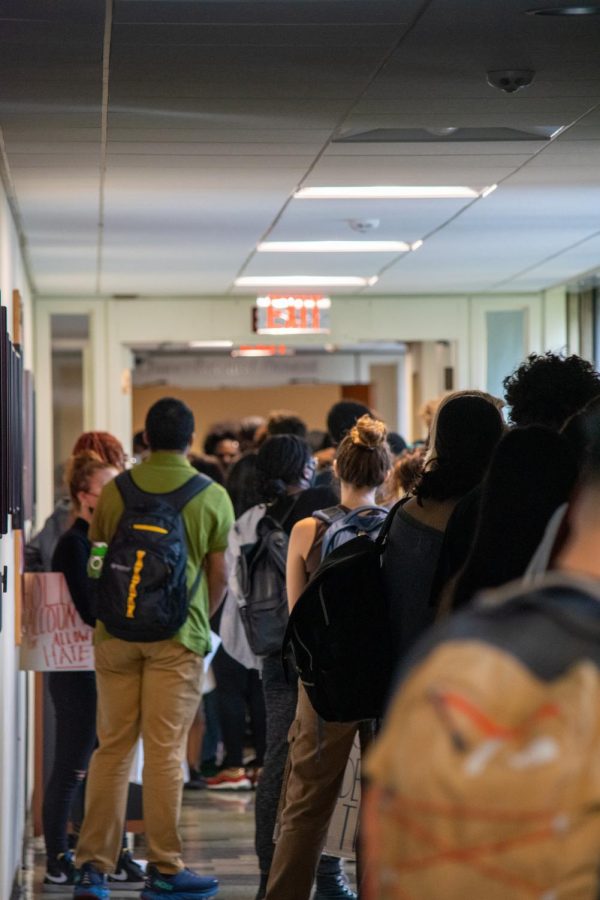Six months ago, I was cautious to embrace the University of Massachusetts’ promise to “return to normal” for the fall 2021 semester. I didn’t believe it was possible to bring the entire student population back to campus without strict COVID-19 restrictions and large outbreaks.
I was wrong, and I’m glad.
COVID-19 cases at UMass have remained fairly steady since mid-September, and campus life feels as busy as it once was, even with the indoor mask mandate and minor restrictions still in place. But as UMass adjusts to a mostly post-COVID world, it’s returned to a host of other campus-wide issues that persist as normal for the University.
This past spring I wrote,“This year will one day be a defining marker in people’s lives. Shouldn’t it be an opportunity to reexamine how things were before and ask ourselves, do we want to return to normal?”
Allegations of sexual assault, instances of racism and a general lack of administrative action are not new problems for UMass. It’s a shame the University could endure a worldwide upheaval and not take the opportunity to rethink every facet of its culture and operation.
According to statistics published by RAINN, 26.4 percent of female and 6.8 percent of male undergraduate students experience sexual assault, and UMass students are no exception. In 2014, UMass was one of 55 colleges and universities facing a Title IX investigation over the handling of sexual assault claims. After seven years and consistent similar complaints, students this semester protested allegations of sexual assault of campus and UMass’ lack of action.
A recent letter contributor to the Massachusetts Daily Collegian detailed reporting their sexual assault case to the University in the fall of 2002.
They filled out an Assault Report Form, they said, with a dean’s assistant, and it was placed in a filing cabinet of other papers.
“UMass emails to students with a list of resources have become the new office and metal filing cabinet. It is easier for the University and the police if these issues continue to be filed away into metal cabinets that will never be opened again,” they wrote. “I blame UMass and the Amherst Police for enabling a system that perpetuates rape and sexual assault.”
A similar pattern occurred with instances of racism on campus. In 2014, UMass student Josh Odam’s dorm door was defaced with a threat and racial slur. Comments on a column he wrote about the incident share a sentiment of disbelief over how something like this happened in this day and age, but racism at UMass has not stopped.
Hundreds of students marched on campus in 2018 after someone wrote a racist message in a Melville Hall bathroom. Following the death of George Floyd and protests for racial justice across the country in 2020, UMass introduced a plan to combat racism, including the creation of a task force for anti-racism and DEI student council.
“We have been repeatedly challenged by this violence and by other disturbing acts – increased anti-Asian racism, growing xenophobia and escalating anti-Semitic attacks. This cannot, and will not, be our normal at UMass,” wrote Nefertiti Walker, the interim vice chancellor for diversity, equity and inclusion and chief diversity officer.
Despite these policies, racist emails were sent to Black student organizations and a racist statement was written on a Black student’s whiteboard in Crampton Hall this semester. Students marched in protest again, calling for the University to apologize for its “failure to respond” to the racist email and institute racial bias training during new student orientation.
University administration officials are not solely to blame for these problems. I understand the challenges of navigating a pandemic are time-consuming on their own, and it’s difficult to overhaul a school’s reputation without years of dismantling oppressive structures and mindsets within the student body. This semester, UMass announced the formation of a Black Advisory Council and a Title IX Student Advisory Task Force, but it’s hard to believe these groups will have any immediate impact given the University’s history of stagnant change. It feels impossible to put an end to UMass’ repetitive problems, but that’s true of anything with real importance.
I don’t have a solution to these complicated, deeply rooted issues, and I don’t expect them to disappear during my time in college. All I ask is for UMass to reconsider its priorities during this transition to pre-COVID life. Normal was never perfect, and it’s far from the best we can do.
Catherine Hurley can be reached at [email protected] and followed on Twitter @cath_hurley.




















